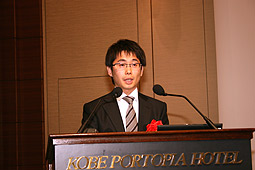 The 8th Iue Asia Pacific Research Prize“Commendation” Winner: Nobu Iwatani
The 8th Iue Asia Pacific Research Prize“Commendation” Winner: Nobu Iwatani
Title of Dissertation: "A Study of the Kuomintang’s Tutelary Regime in Republican China"

- Winner: Nobu Iwatani
-
- 【Career】
Research fellow, National Institute for Defense Studies, Ministry of Defense.Received B.A. (1999), M.A. (2003) and Ph.D. (2008) at Keio University. Enrolled as general scholar student at Renmin University of China (2000-2001), and served as visiting doctoral fellow at the Institute of Modern History, Academia Sinica (2006) before his current appointment
- 【Career】
This thesis elucidates the history of the tutelary regime of the Kuomintang from the formation of the Party's idea and the establishment of its system of governance through to the transformation of the system. The tutelary regime based on the party-state system is a variation of authoritarianism, in which the single party gives instructions to the politically inexperienced people to exercise political rights through local self-government, and rules the nation with this tutelage as a source of legitimacy. Previous research has made clear that the Kuomintang’s tutelary regime during the republican period was a political system comprising the characteristics of authoritarianism. These earlier studies, however, did not elucidate the reasons why the tutelary regime started in preparation for a democratic constitutional system of governance and was forced to transform into the system of authoritarianism. Therefore, the purpose of this thesis is to provide the reasons why the tutelary regime in pursuit of the democratic constitutional system failed to materialize in its expected shape and resulted in the undemocratic system of governance with personal dictatorship.
The tutelary regime ought to have been a system of governance established with the Party's idea of democratization and governance. The Kuomintang, the leading figure of the regime, however, remained a weak party at a low level of institutionalization. The institutionalization of the Party did not make progress because of the non-establishment of an incentive system and the lack of seizure of local resources. The institutionalization of the Party that remained at a low level brought two characteristics to the tutelary regime, i.e., the loose organization of the Party at the base level and the political decision-making by an unstable oligarchy at the leadership level. In the early stages of the organizational and political management of the Kuomintang, the Party evaded autocracy with an iron hand that was inconsistent with the Party's idea of the tutelary regime. This democratic freedom in excess accelerated collapse and centrifugal tendency in the base level party branches and caused the unsteady political decision-making in the party leadership. As a result, it became necessary for governmental organizations to achieve local self-government without the Party's structure in the base level involved. Furthermore, it became necessary to weaken the influence of the Party over policymaking apparatus so that the opposition forces in the Party would not intervene in decision-making.
An interest in dictatorship and an undemocratic administrative system of governance, however, was seen in the Kuomintang. The reason was that the Party had to promote local self-government externally and maintain an intra party democracy and collegiate system internally in order to be faithful to the idea of the tutelary regime, although the organization of the Party was losing substance. The reinforcement of dictatorship and a number of undemocratic systems were paradoxically considered necessary to realize the tutelary regime while maintaining the stable political administration.
The realization of the undemocratic systems, however, weakened the legitimacy of the tutelary regime that should have aimed at a democratic constitutional system of governance. Furthermore, it weakened the legitimacy of the Party itself. When the Kuomintang demanded the stability of its power, the Party fell into a state in which the legitimacy of the government internally was eroded. The essential problem of the tutelary regime of the Kuomintang lay not in the emergence of a dictatorship itself, but in the incompatibility between the government with the establishment of unitary power and the materialization of political tutelage through local self-government, i.e., the legitimacy of the government.
Based on these considerations, this thesis clarified that the tutelary regime of the Kuomintang tried to be faithful to the idea of advocating democracy while the regime lacked the party leadership, and consequently, the regime resulted in a personal dictatorship and undemocratic system of governance that were opposite to the original idea.






